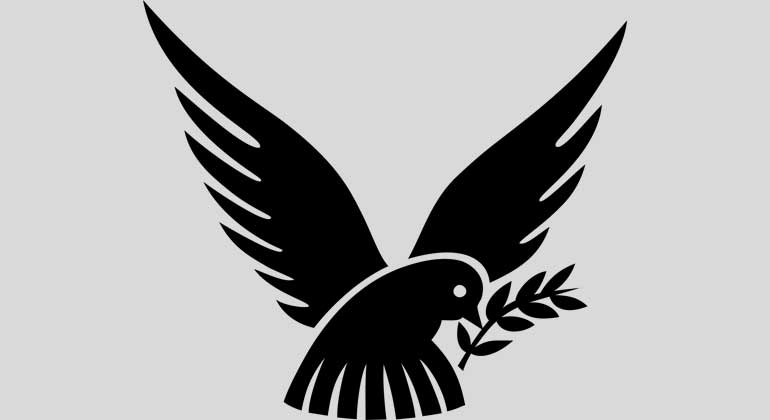Fundamental Pacifism and Real Pacifism
Probably never before have so many former Bundeswehr generals been guests on German television talk shows as in recent months. According to “SPIEGEL,” these ex-generals – such as Lothar Domröse, Erich Vad or Harald Kujat – are now derided in the Bundeswehr as “loden coat squadrons”. More important, of course, is the question of whether these military experts have realistically assessed Putin’s war?
Ex-General Erich Vad, for many years a military adviser to Chancellor Angela Merkel, said at the start of the war, “My assessment is that it will only go a few days and no more.” Ex-General Harald Kujat also said shortly after the invasion that Russia would not launch “a major attack.” Germany, your military experts!
Did the many authors of “open letters” who advised the chancellor to supply weapons or not to supply weapons know better?
How is the war to be ended?
In recent years, peace and conflict research has specialized in the analysis of civil wars. This is one of the reasons why almost all of us were so surprised by a classic war in Europe in 2022. Including me.
We no longer expected two nations to fight each other militarily in Ukraine. But civil war-like conditions have already prevailed in eastern Ukraine since 2014. Prorussian separatists and Ukrainian militias have been fighting each other for years, detached from regular armed forces.
“Wars end when they become too expensive,” Salzburg-based war researcher Lena Oetzel tells the Süddeutsche Zeitung. In the Ukraine war, both sides are acting as if money doesn’t matter at all. As long as both sides believe that they can achieve more on the battlefield than at the negotiating table, they want to keep fighting. Neither is yet ready to be the first to approach the other with open arms. In these days of war, I sometimes wonder why none of these Russian warlords thinks even once about what really counts in life? If they had, the war would have ended quickly.
In these months, Pope Francis has expressed doubts about arms supplies from outside, but at the same time he has underlined the right of every country to defend itself. However, every real pacifist must ask himself how Ukraine is supposed to defend itself without weapons in this war of destruction by Putin. Perhaps we need a detour now.
In the short term, “create peace with weapons” in order to achieve the long-term goal of “create peace without weapons.” That would be a differentiated pacifism – I call it real-pacifism as opposed to fundamental-pacifism.
The fact is: Today’s ruler in Moscow is called Putin and no longer Gorbachev. Our problem is: There is no Mikhail Gorbachev far and wide today, and if there were, he would be in prison like Alexei Nawalny.
Arms supplies yes or no?
But there is one thing we should always be clear about – whichever side we are on: It is always the people in Ukraine who are affected first. Their young men are being killed, their women are being raped, their children and their old people are being forced to flee. German know-it-all attitude is out of the question.
So German pacifism cannot mean that we can recommend to the Ukrainians from the safe ground of our country: Please surrender! That would be pacifism in the sense of the aggressor. It would be a “pacifism” that still holds the door open for the aggressor. What is often forgotten: Already the Austrian original pacifist Bertha von Suttner considered defensive wars legitimate. And the most famous German pacifist Albert Einstein differentiated between “reasonable pacifism” and “irresponsible pacifism”.
Jesus recommends in his Sermon on the Mount: Do not resist! But the question remains: Where does resistance make sense and where not? Where is resistance the lesser evil? Is the thesis: “The faster Ukraine receives defensive missiles, the faster the war will end” really absurd? I remember a situation in Israel where the delivery of German defensive missiles led to the cessation of Palestinian rocket fire. Defense missiles from Germany saved lives.
For pacifists, as for us journalists, our questions are usually more important than our answers. It may be that not defending oneself with weapons costs more human lives than defending oneself with weapons.
Christians whose pacifism is based on Jesus’ Sermon on the Mount, “Do not resist,” must bear in mind that this does not mean accepting everything. That would be a pacifism in the sense of the aggressor – a pacifism that still invites the aggressor to aggression. Pacifism means: Be smarter than your enemy.
In Tibet, military resistance really makes no sense. That would be pure suicide. That is why the Dalai Lama has been calling for non-violent resistance for 60 years and has even threatened to resign as spiritual leader if the Tibetans resort to violence. But this is a completely different situation in Ukraine. Real pacifism is also situational.
Pacifism in the sense of the Sermon on the Mount cannot mean giving up one’s own thinking, one’s own judgments and one’s own decisions. German defensive weapons can also save lives in Ukraine. On the other hand, I prefer a German chancellor who is fundamentally hesitant and dithering about arms exports to one who is a driver. When it comes to war and peace, the same applies to pacifists as to us journalists: Our questions are more important than our answers.
Source
Franz Alt 2022 / Translated with www.DeepL.com/Translator (free version)








